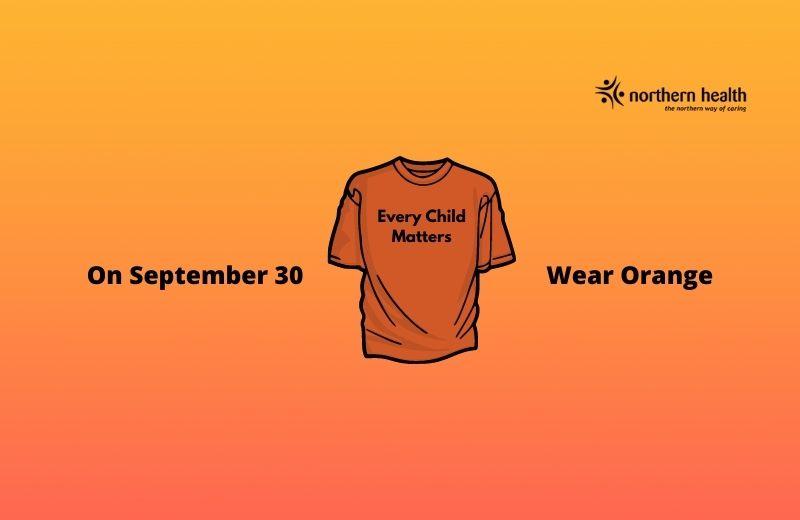Orange Shirt Day is a day to remember, to witness, and to honour residential school survivors, their families, and communities; and to demonstrate a personal and organizational commitment to reconciliation. This year, Thursday September 30 is Orange Shirt Day.
To support Northern Health’s increased awareness and understanding of the significance of Orange Shirt Day, NH’s Indigenous Health team will be sharing information and resources each week throughout the month of September.
In May 2021, we learned of the tragic discovery of the remains of 215 children buried at the former Kamloops Indian Residential School which was built on the traditional territory of the Tk’emlúps te Secwépemc First Nation. Following this discovery, similar reports emerged from other former residential school sites across Canada, including Marieval Indian Residential School in Saskatchewan, where 751 unmarked graves were discovered. The Truth and Reconciliation Commission (TRC) wrote in its Final Report approximately 4,100 unmarked graves are located at more than 130 former schools across the country1.
Truth and Reconciliation Day
The Government of Canada has designated September 30 as the National Day for Truth and Reconciliation. This national day coincides with Orange Shirt Day and is intended to honour and remember the more than 150,000 Indigenous children who were forcibly taken from their families and communities, placed in residential schools, and experienced neglect, abuse, medical experimentation, and other atrocities.
This new statutory holiday also responds to the TRC’s 94 Calls to Action. Specifically, Call 80 calls upon the federal government to establish a statutory holiday to commemorate a National Day for Truth and Reconciliation to honour survivors, their families, and communities2.
Establishing a National Day for Truth and Reconciliation is an important step toward reconciliation. Reconciliation is defined by the TRC as, “…establishing and maintaining a mutually respectful relationship between Aboriginal and non-Aboriginal peoples in [Canada]. In order for this to happen, there has to be awareness of the past, and acknowledgement of the harm that has been inflicted, atonement for the causes, and action to change behaviour3.” This new statutory holiday provides an opportunity for us all to recognize our collective tragic history, commemorate the children, and reflect on the ongoing legacy of residential schools.
What is the TRC?
The TRC was established as part of the Indian Residential Schools (IRS) Settlement Agreement in 2007, which settled the largest class-action lawsuit in Canada’s history. The legal action was launched by several thousand survivors of the IRS. The mandate of the TRC was to inform all Canadians about what happened in the residential school system. To this end, the Commission spent six years travelling to all parts of Canada documenting the truth of survivors, families, communities and anyone personally affected by the IRS experience. One of the key findings of the Commission was that the residential school system facilitated cultural genocide against Indigenous peoples.
In 2015, the TRC released its 6-volume Final Report. The report is a comprehensive record of the policies and operations of the residential schools, the work of the TRC, what the Commission heard from over 6,000 witnesses, and conclusions regarding the residential schools. The report includes 94 Calls to Action which provide a roadmap toward reconciliation in Canada.
Additional resources
- 5 facts about Indigenous Peoples in Northern BC
- An open invitation to address anti-Indigenous systemic racism – An article by Dr. Margo Greenwood, VP Indigenous Health, Northern Health
- Culturally respectful relationships: Some terms and issues
- Cultural safety: Respect and dignity in relationships (video)
- Truth and Reconciliation Commission (TRC)
Support available
Support is available for anyone affected by the residential school experience.
- A national Indian Residential School Crisis Line has been set up to provide support for former students and those affected. People can access emotional and crisis referral services by calling the 24-hour national crisis line: 1-866-925-4419.
- The KUU-US Crisis Line Society provides a First Nations and Indigenous specific crisis line available 24 hours a day, seven days a week, toll-free from anywhere in British Columbia. The KUU-US Crisis Line can be reached toll-free at 1-800-588-8717 or online.
- The Northern BC Crisis Line offers 24/7 support across the NH region, and can be reached at 1-888-562-1214.
[1] Truth and Reconciliation Commission of Canada. (2015). Honouring the Truth, Reconciling for the Future Summary of the Final Report of the Truth and Reconciliation Commission of Canada.
[2] Truth and Reconciliation Commission of Canada. (2015). Calls to Action.
[3] Truth and Reconciliation Commission of Canada. (2015). Honouring the Truth, Reconciling for the Future Summary of the Final Report of the Truth and Reconciliation Commission of Canada.














Comments